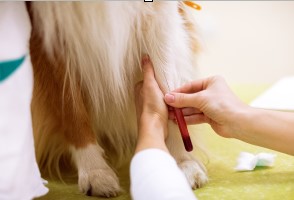Wellness vaccines, testing, and preventative products are all important parts of having a healthy pet. It is almost always easier to prevent health problems in pets than it is to treat illnesses later. For this reason, your veterinarian may recommend a variety of preventative health measures to ensure that your furry friend is as healthy as possible. Here are some common vaccines, tests, and products that are frequently used to help keep your dog healthy.
Vaccines
One of the simplest and most important ways to keep your pet healthy is to keep them up to date on vaccinations. Vaccines work by stimulating your pet’s immune system to help protect against a variety of infectious organisms. Below are some commonly administered vaccinations in dogs:
– Rabies: This is the most important vaccine in dogs. Rabies, which is transmitted through saliva, is universally fatal if infection occurs. This is a disease that can be spread to all mammals, including humans. In Pennsylvania, all dogs over 12 weeks of age are required to be vaccinated against rabies.
– Distemper (also known as DA2PP or DHPP): This combination vaccine protects against a variety of organisms such as the distemper virus, adenovirus type 2, parvo virus, and parainfluenza. All of these viruses, particularly distemper and parvo virus, can make dogs extremely sick and may even lead to death.
– Leptospirosis: The leptospirosis vaccine is very important for protection against a genus of bacteria know as leptospira. This bacterium can lead to a variety of serious problems including kidney and liver failure and can lead to infection in humans as well.
– Lyme: Lyme disease is a very common illness in dogs. This illness is spread by deer ticks, and can lead to a variety of symptoms including joint and kidney problems. The risk of contracting Lyme disease can be greatly reduced in dogs by yearly administration of the Lyme vaccine and proper tick prevention products.
– Bordetella (also known as kennel cough): The bordetella vaccine is useful for reducing the risk of catching common upper respiratory infections in dogs. These upper respiratory infections can often be spread between dogs at parks, kennels, and any other situation in which dogs are in close contact with one another. 
A number of other vaccines exist as well. Your veterinarian will be able to advise you on what vaccines are right for your pet.
Wellness Testing
Many diseases, illnesses, and disorders in dogs can be detected through wellness testing. To ensure that no underlying problems exist, your veterinarian may recommend a variety of tests. If abnormalities or diseases are detected, we are often able to treat the patient before clinical symptoms develop. Below are some commonly performed tests in dogs:
– Wellness Bloodwork: This test allows us to asses many different parameters in dogs, and also gives us an idea of how your pet’s internal organs are functioning. Wellness bloodwork can be useful in screening for and diagnosing several different issues such as anemia, infection, liver disease, kidney disease, metabolic disorders, cancers, and autoimmune problems. 
– Heartworm and tick-borne illness testing: Heartworm is a severe parasitic disease in dogs that is spread through mosquito bites. Heartworm primarily affects the heart, lungs, and circulatory system and can be fatal in some cases if not detected early. Tick-borne illnesses commonly tested for include Lyme disease, anaplasmosis, and Ehrlichia. These diseases can make your dog very ill and can lead to symptoms such as fever, joint and kidney disease, and anemia.
– Fecal testing: This test allows us to check your dog for a variety of intestinal parasites such as worms and protozoa. These parasites can lead to symptoms such as weight loss, diarrhea, and vomiting.
– Urine Testing: In some cases, your dog’s urine can be used to screen for many different diseases, such as diabetes, infections, and kidney issues.
Preventative Products
Fleas, ticks, intestinal parasites, and heartworms can all be prevented by placing your dog onto preventative products. Flea and tick preventatives come in a variety of forms such as oral tablets, topical liquids, and collars. Some of these products can only be obtained via prescription, while others can be obtained over the counter. Just be sure to ask your veterinarian’s opinion prior to administering a flea and tick preventative product. Many over the counter and natural formulations are not very effective and, in some cases, can even be harmful.
Heartworm preventative products are obtained through prescription only. Most of these products also help to kill intestinal worms too. Before starting heartworm prevention, your veterinarian may need to perform a heartworm test to assure that your dog is not currently infected.
So What Do I Do Now?
The bottom line is that many different vaccines, tests, and products exist to help keep your furry friend healthy. At your appointment, your veterinarian will be able to provide guidance towards the proper preventative steps to keep your dog healthy!
Stay tuned for part 2 of this blog where we will focus on our feline friends!

